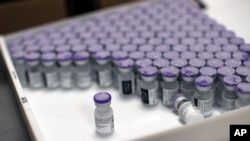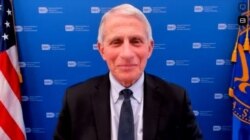The United States is marching ahead with sending free vaccines to lower-income nations, with the White House on Thursday announcing a donation of nearly 300,000 doses of the two-shot Pfizer vaccine to the landlocked central Asian nation of Tajikistan.
The doses are set to ship Thursday, a White House official told VOA.
Just a day earlier, the White House announced that the U.S. hit the milestone of 400 million donated doses to at least 112 countries. VOA spoke exclusively to Dr. Anthony Fauci, chief medical adviser to U.S. President Joe Biden, who said that international vaccine donations are part of the U.S. strategy to beat the pandemic.
"It's absolutely critical," Fauci told VOA via Zoom. "You address a global outbreak by a global solution and a global effort. And that's why the United States has been committed to, and will deliver on, vaccine doses to low- and middle-income countries."
The latest donation will see the central Asian nation receive 299,520 doses of the Pfizer vaccine. The donation will be handled by COVAX, a global initiative founded to ensure equitable access to COVID-19 vaccines. Scientific, legal and regulatory teams in both nations will ensure the prompt delivery of safe and effective tranches of vaccine, the White House said. These new doses come from the half-billion doses secured by the Biden administration over the summer, according to the White House.
Critics have said that while the U.S. has done more than any other nation, the world's wealthiest country can afford to do still more.
Some are pushing for the global adoption of the TRIPS waiver, an agreement that would waive patents and intellectual property rights on COVID-19 tools like vaccines, therapeutics, tests and more.
"I don't think that that's really necessarily a part of the puzzle, because it's very clear that we can get doses that are manufactured in the plants that are already going full-blast to the low- and middle-income countries," Fauci said, when asked about how the TRIPS waiver fits into the fight against the pandemic. "I mean, obviously, you want to make sure that you have everything you can do to make doses available for the developing world. But I think we can do that on the basis of what's going on right now."
Global aid groups say the waiver is key.
"The U.S. should lead in responding to what low- and middle-income countries are asking for — the ability to manufacture their own doses for their own citizens," said Robbie Silverman, senior manager of private sector advocacy at Oxfam America. "This starts with adopting the TRIPS waiver, opening the vaccine recipe, sharing the technical know-how, and providing resourcing to qualified manufacturers throughout the world," he added.
"The waiver is needed now more than ever," said Candice Sehoma, South Africa advocacy officer for Doctors Without Boders' Access Campaign.
VOA asked Fauci whether the U.S. might retool its vaccine donation plans now that booster shots are becoming the norm in the developed world.
"I think the donation effort is really substantial and will get better and better," he said. "And I think, ultimately, that will accommodate the need for boosters. But let's take one step at a time. A very small percentage of some of the countries, particularly in southern Africa, are fully vaccinated. Let's get that first, and then we'll worry about the boosters. But we do appreciate the need, ultimately throughout the world, to get people optimally protected. And we know that optimal protection with an mRNA [vaccine] means a third shot. And with [the one-dose Johnson & Johnson vaccine] means a second shot."
The most recent recipient of American donations, Tajikistan, appears to be moving swiftly on its vaccination campaign. As of the start of the year, nearly 6.9 million vaccine doses have been administered in the nation of 10 million people, according to the World Health Organization.
Tajikistan has seen more than 17,600 confirmed cases of the virus and 125 deaths.
Jorge Agobian contributed to this report.





